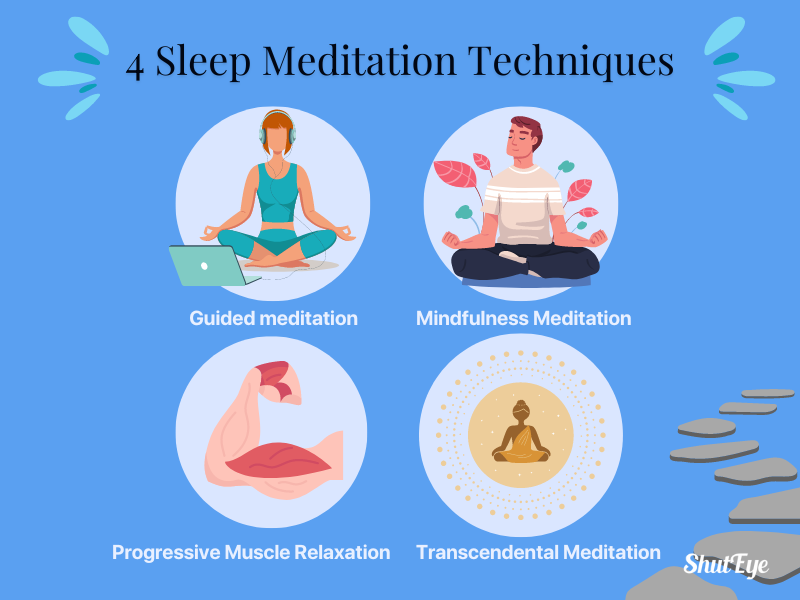


Meditation is a simple practice often used in numerous religious or spiritual traditions. However, it can also be used to reduce stress and promote a sense of peace or calmness which can be beneficial for getting better sleep at night.
In this article, we’ll explore further meditation for sleep, its benefits, and other methods to help you get a good night’s sleep. Keep reading below to get the full details.

Meditation was originally used in Ayurveda, a natural healthcare system from Ancient India. Now, it is mainly used as a term to loosely refer to techniques that provide health benefits [1]. Some of these common techniques include reflection, concentration, the use of nature sounds, guided meditations, mantras, yoga, or breathing exercises.
The main purpose of meditation is to help you connect to your deep inner self by mainly working with the senses, mind, and emotions.
Besides this, there are also other benefits of meditation, one of which is to improve sleep quality.
Here are some of the benefits of practicing meditation before bedtime:

Many different kinds of meditation techniques can help you get restorative sleep. In this section, you’ll find 4 of the more common sleep medication techniques.
Guided meditation is a technique that involves meditating under the guidance of an experienced guided meditation teacher or practitioner. It can either be done in person or via a recorded video or audio session.
Most guided meditations tend to focus on an object as a way to cultivate and train the mind to be mentally calmed and build present-moment awareness. It can come in the form of breathwork, visualization, mantras, or the use of an actual physical object [6].
If you struggle with falling asleep or staying asleep at night, guided meditation can aid in physical relaxation and promote better deep sleep quality.
Here is an example of a guided meditation for sleep:
Mindfulness meditation is a practice that focuses on training your mind to achieve calmness and cultivate positive thoughts. It is about channeling awareness and observing your breathing, thoughts, and physical sensations that you feel in your body, and in your emotions presently.
In doing so, you prevent your mind from drifting and worrying about things from the past or future. Focusing too much on events that have already taken place or have yet to happen would only cause sleep disturbance like insomnia.
Here is an example of a mindfulness meditation for sleep:
Progressive Muscle Relaxation (PMR) is a relaxation technique, developed by Edmund Jacobson in the 1920s. It involves contracting your muscles and progressively relaxing them until you are completely relaxed.
Studies have also shown that following this technique can help reduce stress levels, depression, and anxiety [7]. In separate randomized controlled trials, progressive muscle relaxation has also been shown to reduce pre-sleep anxiety, decrease sleep onset latency, and increase the time spent in slow-wave sleep [8], [9].
Transcendental Meditation is a type of meditation technique that was introduced by Maharishi Mahesh Yogi in the 1950s. It is a silent meditation that requires you to repeat a mantra or a sound silently, for 15 to 20 minutes twice per day.
This form of meditation is usually taught by certified instructors and is seen as a non-religious method that promotes self-awareness, stress relief, self-development, and greater consciousness [10].
A recent study, focusing on healthcare workers, found that transcendental meditation has helped to improve chronic stress that is associated with symptoms of burnout, anxiety, and insomnia. Therefore, this shows that it can be beneficial for people with sleep problems or disorders [11].

Practicing mindfulness and being aware of how you feel in the present moment does not always come naturally for everyone. Some may find it challenging to make it a part of their daily bedtime routine.
It’s completely normal to experience some form of challenge or obstacle when practicing meditation for the first few times. Our minds may wander off halfway through the process— it happens.
The common challenges that people tend to face are:
Overcoming these challenges does not happen overnight. It requires patience and persistence.
Some steps that you can take to overcome these challenges:
Aside from meditation practice, you may also want to consider these tips for a better night’s rest:
Stick to a consistent sleep schedule by going to bed and waking up at the same time every day, even on weekends. This will regulate your body’s circadian rhythm so that you fall asleep more easily and wake up refreshed.
To find the best time for you to sleep, try out our free sleep calculator!

Before going to bed, you want to adopt a relaxed and calm state of mind. Try engaging in calming, self-care activities such as reading a book, taking a warm bath, doing a face mask, or listening to gentle music.
You also want to make sure to avoid using your electronic devices or doing any physical exercise at least 30 minutes to 1 hour before bed. Blue light and stimulating activities can affect your body’s ability to produce melatonin. Thus, disrupting your ability to fall asleep.
Avoid heavy meals, caffeine, and alcohol when it is closer to bedtime. Eating before sleeping might not give your body adequate time to digest the food. This can cause indigestion and might arouse you from a deep sleep. If you are feeling hungry before bed, opt for a light snack like yogurt or banana instead.
In addition, caffeine and alcohol are known to be stimulants that can keep you up at night. If you do plan on drinking any form of caffeine or alcohol, make sure that you give yourself a minimum cut-off time of 8 hours to reduce sleep problems.
See also: 10 Foods That Help You Sleep Better
Besides this article, here are also more meditation resources that can help you achieve improved sleep quality at night:
5 Best Meditation Apps In 2024
Best Meditation Practices For Sleep and Relaxation
Can Meditation Replace Sleep for Rest and Recovery?
Meditation is a useful tool that can help you improve sleep quality by reducing sleep disturbances, stress, and anxiety, helping you to relax and enhance your mental clarity. If you are currently dealing with insomnia and looking for a natural solution, consider including meditation in your pre-bedtime routine.
For more meditation practices and audios, try out our all-in-one sleep app, ShutEye®. ShutEye® features a series of meditation sounds, guided meditation and breathing exercises for better sleep. Try it today!
Corliss, J. (2014) Mindfulness meditation may ease anxiety, and mental stress [online]. Available at: https://www.health.harvard.edu/blog/mindfulness-meditation-may-ease-anxiety-mental-stress-201401086967
Corliss, J. (2020) Mindfulness meditation helps fight insomnia, improves sleep [online]. Available at: https://www.health.harvard.edu/blog/mindfulness-meditation-helps-fight-insomnia-improves-sleep-201502187726
Conway, S.M. (2024) Meditation and the Autonomic Nervous System [online]. Available at: https://mindworks.org/blog/meditation-autonomic-nervous-system/
Jerath, R., Beveridge, C., & Barnes, V. A. (2019). Self-Regulation of Breathing as an Adjunctive Treatment of Insomnia. Frontiers in psychiatry, 9, 780. Available at: https://doi.org/10.3389/fpsyt.2018.00780
Joshi, S. P., Wong, A. I., Brucker, A., Ardito, T. A., Chow, S. C., Vaishnavi, S., & Lee, P. J. (2022). Efficacy of Transcendental Meditation to Reduce Stress Among Health Care Workers: A Randomized Clinical Trial. JAMA network open, 5(9), e2231917. Available at: https://doi.org/10.1001/jamanetworkopen.2022.31917
O'Bryan, A. (2021) How to Perform Body Scan Meditation: 3 Best Scripts [online]. Available at: https://positivepsychology.com/body-scan-meditation/
Rusch, H. L., Rosario, M., Levison, L. M., Olivera, A., Livingston, W. S., Wu, T., & Gill, J. M. (2019). The effect of mindfulness meditation on sleep quality: a systematic review and meta-analysis of randomized controlled trials. Annals of the New York Academy of Sciences, 1445(1), 5–16. Available at: https://doi.org/10.1111/nyas.13996
Sharma H. (2015). Meditation: Process and effects. Ayu, 36(3), 233–237.Available at: https://doi.org/10.4103/0974-8520.182756
Simon, K. C., McDevitt, E. A., Ragano, R., & Mednick, S. C. (2022). Progressive muscle relaxation increases slow-wave sleep during a daytime nap. Journal of sleep research, 31(5), e13574. Available at: https://doi.org/10.1111/jsr.13574
Sun, J., Kang, J., Wang, P., & Zeng, H. (2013). Self-relaxation training can improve sleep quality and cognitive functions in the older: a one-year randomised controlled trial. Journal of clinical nursing, 22(9-10), 1270–1280. Available at: https://doi.org/10.1111/jocn.12096
Transcendental Meditation. (2024, September 27). In Wikipedia. Available at: https://en.wikipedia.org/wiki/Transcendental_Meditation
Toussaint, L., Nguyen, Q. A., Roettger, C., Dixon, K., Offenbächer, M., Kohls, N., Hirsch, J., & Sirois, F. (2021). Effectiveness of Progressive Muscle Relaxation, Deep Breathing, and Guided Imagery in Promoting Psychological and Physiological States of Relaxation. Evidence-based complementary and alternative medicine : eCAM, 2021, 5924040. Available at: https://doi.org/10.1155/2021/5924040
Yogapedia (2023) Guided Meditation [online]. Available at: https://www.yogapedia.com/definition/11523/guided-meditation